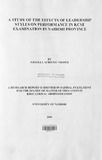| dc.description.abstract | This study was set to determine the effects of leadership styles on performance in KCSE examination in Nairobi province. Specifically, the study determined the leadership styles of secondary school headteachers, the performance of the schools in Nairobi province in KCSE examinations, the effect of leadership styles on the performance, the involvement of teachers and parents in discussions related to performance and whether exposing headteachers to in-service training and the duration of these courses had any significant influence on the leadership style. Other factors such as age, gender, professional group of teachers, experience of the teacher, and school category and their influence on the leadership style were analysed.
The study gathered the pertinent data using questionnaires. The research design was ex post facto. The research instrument was validated using the results of the pilot study. Reliability was computed using Pearson’s correlation co-efficient between the scores of the even-odd numbers after which the reliability was determined using Spearman Brown Prophecy formula.
Random sampling was used to select respondents from a population of about 1536 teachers and 47 headteachers. The sample consisted of 310 teachers and 40 headteachers. Krejcie and Morgan’s (1970, in Njuguna, 1998) table for determining sample size was used to determine the number of teachers and headteachers from a population of about 1536 teachers and forty-five headteachers. Random sampling was used in selecting respondents from each school.
XV
The instruments were administered through personal visits paid to the school by the researcher. The completed questionnaires were collected after a week although some respondents took a longer period. The questionnaire return rate was high (96.25%) for teachers and moderate (67%) for headteachers.
Descriptive statistics was used in data analysis using Statistical Package for Social Sciences (SPSS). The research questions were answered after careful data analysis and interpretation of results. Tables showing frequencies, percentage, means and standard deviations were used to show if there were differences between dependent variables such as leadership behaviour and style, and independent variable such as years of teaching experience, chronological age and in-service training participation or non participation of headteachers. Data analysis results were then interpreted accordingly and conclusions drawn.
Conclusions of the study:
The headteachers perceived themselves as being very democratic while most of their teachers saw them as being just democratic.
Most of the headteachers were perceived by their teachers as exhibiting democratic style of leadership and a smaller proportion exhibiting autocratic style of leadership. Majority of the headteachers did not exhibit laissez faire style of leadership.
XVI
The headteachers were rated lower in relationship oriented leadership behaviour than in task oriented behaviour.
Most of the headteachers who were perceived as exhibiting democratic style of leadership had considerably higher performance index in Kenya Certificate of Secondary Education (KCSE) Examination than those perceived as being autocratic.
The headteachers who had participated in the in-service training were rated higher in relationship oriented leadership behaviour than their counterparts who had not participated.
The professional group of headteachers (holders of certificates in education) influence the leadership style by encouraging democratic leadership style.
Most of the headteachers had attended courses in administration. The courses were short and only lasted a few days to one week. The courses were not frequent.
The headteachers ranked Kenya Secondary Schools Heads Association and the Ministry of Education, through Kenya Education Staff Institute (KESI) first and second respectively as being the organisations that have had an impact on their leadership styles.
Most of the schools held some meetings between teachers and parents to discuss performance in general and poor performance in particular.
xvu
Recommendations:
Recruit trained headteachers but offer regular post training courses. The headteachers who had participated in various training programmes were rated higher by their teachers and were perceived to be more democratic than non-participants.
Strengthen guidance and counselling in day and mixed schools. These schools had a lower performance index than the boarding schools. Guidance and counselling may help to change attitudes towards learning.
Vigorous and frequent training programmes should be sustained. The content covered should focus on human relations in organisations. This concern is raised because 74% of the headteachers have served in this capacity for less than ten years and there is need for in-service training to improve management skills, interpersonal skills and competence | en_US |

